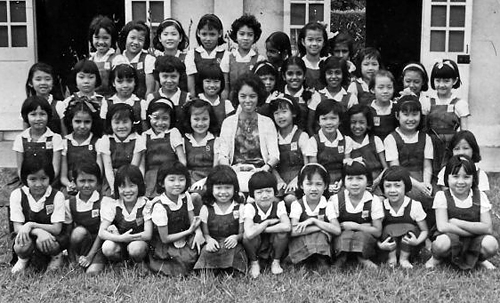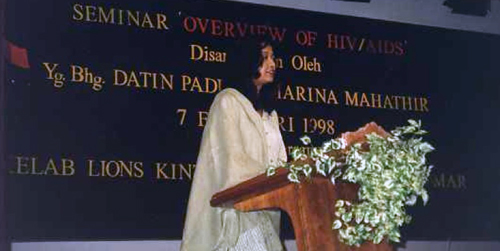Liberal, Muslim, feminist, and comfortable
Shanon Shah, The Nut Graph
DATIN Paduka Marina Mahathir is a renowned and often controversial Malaysian activist, writer, and commentator. She has worked in a variety of fields, from heading the Malaysian AIDS Council, to kicking off the successful feminist television programme 3R, to holding a bi-weekly column in The Star. She is currently a board member for Muslim women’s organisation Sisters in Islam.
But controversy surrounds Marina also because of her lineage — she is the eldest child of Malaysia’s longest serving and controversial Prime Minister Tun Dr Mahathir Mohamad. In this exclusive interview with The Nut Graph in Kuala Lumpur on 23 March 2010, Marina talks about her childhood, her roots, and the Malaysia she wants to see in the future. The first version of this interview was published exclusively in Volume 1 of Found in Malaysia.
TNG: When and where were you born?
Marina Mahathir: I was born in Alor Setar, in 1957. I am just two months older than the country. [I was born in the] Alor Setar General Hospital and so were all my siblings.
We used to live in Jalan Maxwell. At the back [were] the padi fields and the railway road. We lived [in the government quarters] until I was 10.
We [then] moved to Jitra, [and we lived in government quarters] because [my mum] was the civil servant; my dad went into private practice quite early. In 1968 or 1969, we moved into our own house in Titi Gajah.
Did the violence of 13 May 1969 touch Alor Setar?
As far as I recall there were no riots. But there was fear. I remember the elections. I remember asking my dad, “So, did you win?” And he said, “No, I lost.” And I couldn’t believe it, because at that time he ran in Kota Setar Selatan. He lost to (former PAS chief) Haji Yusuf Rawa, who happens to be my mum’s cousin, [but] not a first cousin.

Std 1A at St Nicholas Convent: Marina (second row, third from right), Standard One A at St Nicholas Convent, 1964
So you are related to PAS central committee member Muhajid Yusof Rawa?
Yes. But it’s not like we’ve ever met lah. On my mum’s side, my grandfather is Rawanese. He came from Sumatera. We still have relatives in Sumatera. In 1968, our first overseas holiday was to Medan. A couple of years ago, after the tsunami, [my parents] went to Medan and visited all these relatives as well. My mum is very keen on all this, and she will keep track.
So you can trace your ancestry on your mum’s side. This is the million ringgit question: What about your dad’s side?
We don’t know. My dad had these two older sisters whom he was very close to. The second sister, Mak Bibi, had a very good memory [about] all sorts of family connections. But unfortunately, she passed away first. The older sister — she’s 10 years older than my dad, who is the youngest — was hard of hearing. She passed away last year.

Marina Mahathir giving a talk (1998)
But there is a Malabari connection on your dad’s side?
Well, actually this was news to me recently. I have another aunt, [a close family friend] who is not directly related, [who] once told me where the family came from. I was quite young, so I didn’t really take note. But it formed the impression in my mind that we must have come from the Eastern coast of India. But I never checked it out.
It was only when I went for this aunt’s funeral that I asked my cousins where they thought we came from. And that was the first time the word Kerala came up. I looked it up and I thought, “Eh, that’s funny — it’s on the Western coast [of India].” […]
But then with ports, what does it matter? You get on a boat and then you go. And there are a lot of Keralans here — Hindus, Muslims and Christians — so there is a long connection between Kerala and here. So it’s possible [to trace], but I wouldn’t know where to start. Because this would be my dad’s grandfather, my great-grandfather Tok Iskandar. […]
Iskandar came over and married a local woman and had my grandfather, Mohamad, and at least one other female sibling…my father’s auntie.
So, I only know of one sibling [of my grandfather’s]. But we don’t know what happened to my great-grandfather, or our great-grandmother. Nobody knows her name. It’s all [because of] very poorly kept records, or nobody thought of [keeping records].
So all these people who keep saying my grandfather’s name was Iskandar Kutty — we don’t know where that comes from. We’ve never heard the name.
How does that make you feel, though, the way detractors discredit your dad by pulling this out? Many would consider it racist.
Of course it is. And I think that’s why he’s so sensitive about it, because it [questions] his Malay-ness. I had this ex-schoolmate who used think it was funny, who still thinks it’s funny, to make jokes and tease us for being keling. So it’s a sensitive thing, because you’re subjected to so much racism.
[But] when I went back for my aunt’s funeral, I looked at everyone around and it was quite clear that we all have sub-continental origins.
My grandfather’s mother was Malay, and he was brought up by her. And then he married a Malay, my grandmother, who is a Wan. Wans were palace[-connected], so that Wan side is well-documented. My dad’s mum was Wan Tempahwan.
Was Alor Setar very cosmopolitan [when you were growing up]?
We had a mixed group of friends. My first best friend when I was in kindergarten was Ann Wong, who lived across the road.
[I also went to] a convent [school]. A lot of Malays didn’t want to send their daughters there, because takut jadi Kristian, kan? So in my class, I think there were no more than four Malay girls at any one time.
When I was in Form Four, I went off to TKC (Tunku Kurshiah College). In Form Five, I sent a postcard back to my old school: “Good luck for MCE (Malaysian Certificate of Education), hope to see you all here.” And that was a big faux pas, because obviously I wasn’t going to be seeing the Chinese ones there. So apparently I upset a lot of people. But I really didn’t think of it in that way.
How has all of this, including the faux pas, shaped the kind of Malaysian you are today?
I’m very sad. I don’t understand all this segregation. I went through it when [convent schools were] English medium, and I know, for instance, that there was no attempt to convert anyone either way.
At first I didn’t want to go to TKC because it was single-race. And my dad got a bit upset about that. But [in the end] it was quite good in one thing. You know, early impressions can really get into your head. I had grown up with the impression that Malay [Malaysians] were not clever. I used to get first or second, but there’s the impression that others are cleverer than you.
So when I went to TKC, I saw Malay girls who had gotten 7As, 8As. Adakah? It really did something to your head. It’s possible [to achieve this] — we’re not genetically backward. So the positive aspect of that was good.
The other idea I grew up with was that girls were not as clever as boys. It’s only when I went to Sultan Abdul Hamid College (SAHC) — briefly in Form Four before going to TKC and then in Lower Six — that I realised that not all boys are smart. So sometimes you need this change of environment to open up the world for you.
In TKC, I was exposed to a whole variety of Malays — all classes and all type of faces. The hitam legam and the putih melepak. The Mat Salleh type pun ada. It was quite diverse.

